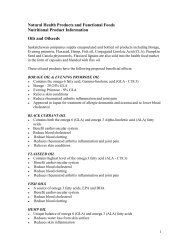Beyond Borders: Global biotechnology report 2010
Beyond Borders: Global biotechnology report 2010
Beyond Borders: Global biotechnology report 2010
Create successful ePaper yourself
Turn your PDF publications into a flip-book with our unique Google optimized e-Paper software.
India year in review<br />
Preparing for the opportunities ahead<br />
India’s biotech industry has blossomed<br />
in recent years, as domestic companies<br />
have grown aggressively in a liberalized<br />
intellectual property (IP) regime and as<br />
companies everywhere have sought to seize<br />
opportunities from the country’s large,<br />
skilled workforce, lower manufacturing and<br />
research costs and the growing demand<br />
for health care. Unlike biotech sectors in<br />
many parts of the world, the Indian biotech<br />
industry, which has been less reliant on<br />
capital from investors, was not hurt by the<br />
global recession — indeed, many domestic<br />
companies were positioned to benefit<br />
from the increased focus on cost-cutting<br />
in the West. The year saw significant<br />
developments on several fronts, as well as<br />
some setbacks.<br />
Regulatory reform: the quest<br />
continues<br />
India’s move toward a standardized approval<br />
system continues. A bill to establish<br />
a centralized National Biotechnology<br />
Regulatory Authority (NBRA) to approve<br />
the majority of biotech products — initially<br />
drafted in July 2008 (see last year’s <strong>Beyond</strong><br />
borders for more details) — is currently open<br />
for comments from industry and other<br />
stakeholders. The regulatory reform drive<br />
got an unexpected push from an unlikely<br />
source, the Bt brinjal controversy (discussed<br />
later in this article), and some industry<br />
watchers anticipate that the bill could be<br />
introduced in Parliament during the first half<br />
of <strong>2010</strong>. While it faces strong opposition<br />
from the lobby against genetically modified<br />
(GM) crops, the industry views the<br />
establishment of the NBRA as critical for<br />
boosting its global competitiveness.<br />
Even as India moves toward a centralized<br />
regulatory authority, segment-specific<br />
issues will need to be addressed with<br />
specific regulations. In June 2009, the<br />
central Government proposed a national<br />
policy on vaccines to create a separate<br />
vaccine regulatory authority. The<br />
proposal — currently being drafted by<br />
the Ministry of Health and the Indian<br />
Council of Medical Research (ICMR) — aims<br />
to streamline production and boost the<br />
viability and affordability of essential<br />
vaccines, particularly for the national<br />
immunization program. The policy is<br />
also likely to give preference to<br />
public sector undertakings (PSUs) for<br />
manufacturing vaccines for the national<br />
immunization program.<br />
To streamline the growing clinical research<br />
industry in the country, the Drug Controller<br />
General of India (DCGI) drafted a proposal<br />
to make mandatory the registration of all<br />
clinical trials as well as Clinical Research<br />
Organizations (CROs). The proposal includes<br />
guidelines on proper documentation and<br />
standard operating procedures for various<br />
trial-related tasks carried out by CROs.<br />
New legislation is also being considered<br />
to boost incentives for commercializing<br />
intellectual property generated by publicly<br />
funded research projects. The lack of such<br />
incentives has historically resulted in the<br />
underutilization of IP from such projects,<br />
especially in academic institutions.<br />
Agricultural biotech: the Bt brinjal<br />
issue<br />
With almost 60% of India’s population<br />
directly or indirectly engaged in agriculture,<br />
major agricultural policy changes can<br />
be controversial. This was manifested in<br />
the agricultural <strong>biotechnology</strong> segment<br />
36 <strong>Beyond</strong> borders <strong>Global</strong> <strong>biotechnology</strong> <strong>report</strong> <strong>2010</strong><br />
when the government put the commercial<br />
cultivation of genetically engineered<br />
eggplant, Bt brinjal, on hold in February<br />
<strong>2010</strong> after facing strong opposition from<br />
states and various environmental groups.<br />
This decision was taken despite the fact that<br />
India’s agriculture ministry and the Genetic<br />
Engineering Approval Committee (GEAC,<br />
the main regulatory body responsible for<br />
genetically engineered organisms) certified<br />
the safety of this eggplant variety for<br />
commercial release. Had Bt brinjal received<br />
commercial cultivation approvals, it would<br />
have been the first GM food crop to enter<br />
the Indian market and the world’s first-ever<br />
GM vegetable to be grown on a large scale.<br />
India has been conducting field trials on GM<br />
versions of crops, including rice, mustard,<br />
cauliflower and peas, for nearly a decade<br />
but has not approved any GM crop except<br />
cotton. The failure of Bt brinjal to reach<br />
the market could create hurdles for the<br />
clearance of the approximately 40 GM<br />
food crop applications currently pending.<br />
However, the controversy has boosted<br />
arguments for a single-window<br />
clearance mechanism for all aspects<br />
of <strong>biotechnology</strong> regulation.<br />
Stem cell research<br />
Indian companies have been active in the<br />
area of stem cell research. In March 2009,<br />
Stempeutics Research received an approval<br />
from the DCGI to conduct human clinical<br />
trials for drugs using stem cells. India is<br />
now the second country, after the US, to<br />
allow human clinical trials for drugs using<br />
dormant cells in the body with natural<br />
regeneration capabilities.<br />
Singapore-based CordLife established cordcell<br />
banks in India in November 2009. Fortis








